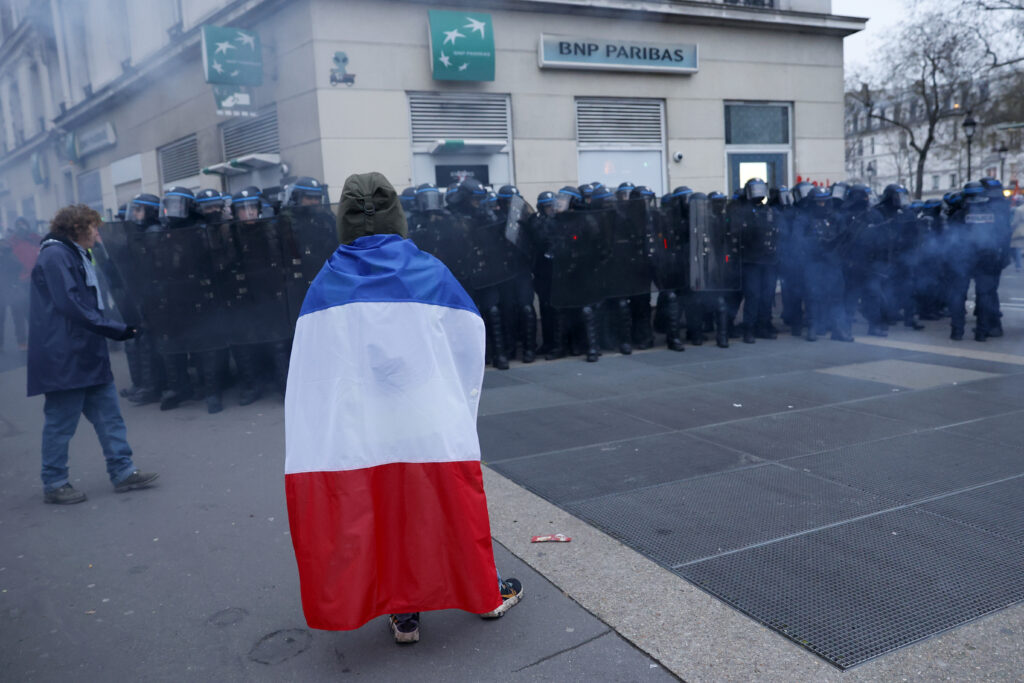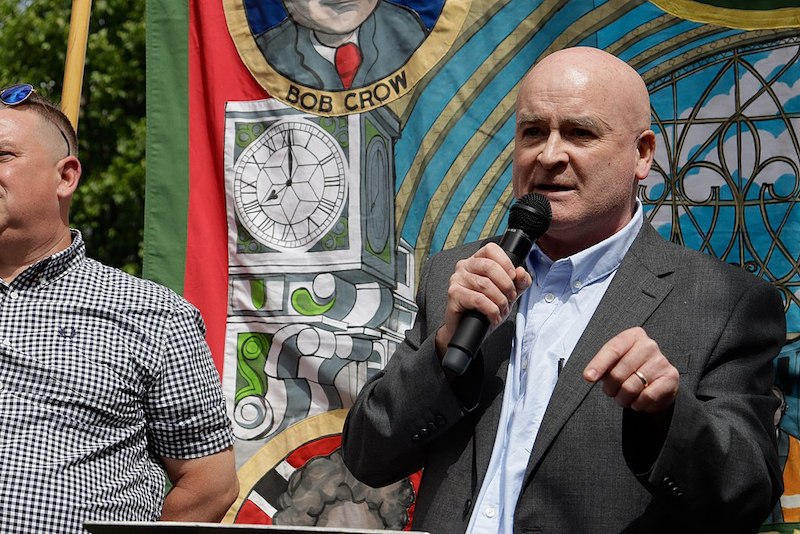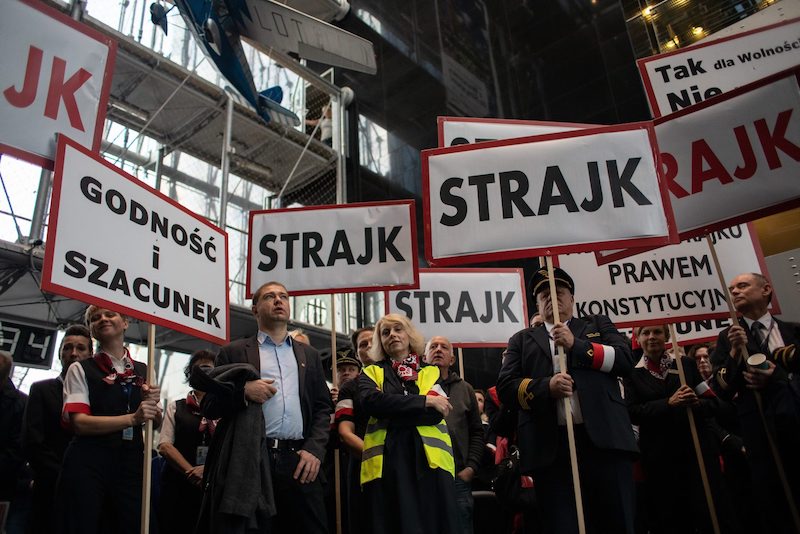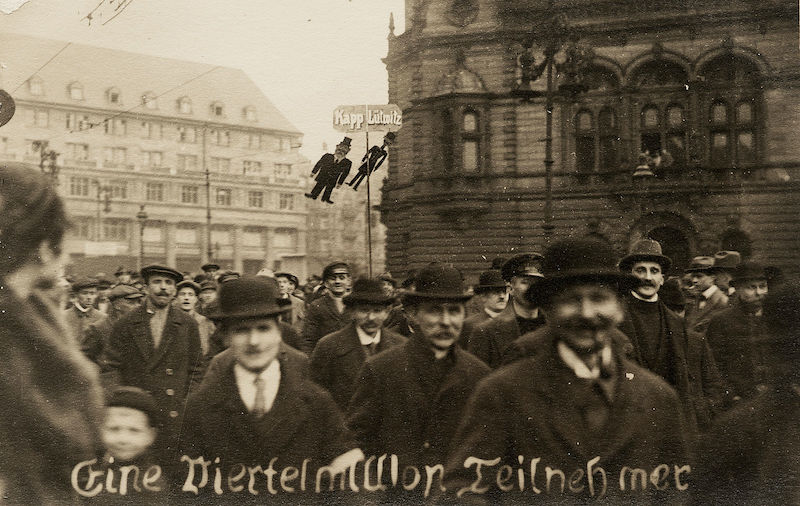Hi from Skopje,
“Retirement before arthritis!” — This loud chant echoes through my room as I watch a video of the massive protests in France on January 19 against President Macron’s plan to raise the retirement age. It makes me think of the immense potential power that workers, all of us, have, when we unite for an urgent cause.
It’s called social dialogue, when governments, employers and workers sit together and discuss their common interests in economic and social policies. But what happens when the calls of workers keep falling on deaf ears, and they feel misrepresented or not represented at all?
Strikes and the hard earned right to organise and take to the streets are an important part of European labour culture. And yet, there are parts of Europe where unions are still not common and they are even banned in many companies.
This winter, there will be more protests in France, the UK and across Europe, as workers fight back against their governments’ push for legislation that not only curbs their rights, but also impedes the right to strike.
Siniša-Jakov Marusic, this week’s Editor-in-Chief

European countries are facing a wave of attempts to repress dissent, although our collective awareness as a continent is still low.
The debut of Giorgia Meloni’s government was disconcerting. On 31 October, thousands were allowed to gather to celebrate the centenary of Mussolini’s March on Rome, at his birthplace at Predappio. In the same period, the police were beating up students protesting against an event attended by members of Meloni’s party, at La Sapienza University in Rome.
An ill wind was blowing that gave birth to the so-called “rave decree”. After police evacuated a rave in Modena, the far-right government launched a plan to ban gatherings of more than 50 people, if they “occupy places and threaten public order”. The debate escalated and coalition partner Forza Italia succeeded in smoothing the decree.
The problem of limiting dissent not only concerns Italy. In February 2022, Hungary’s Prime Minister Viktor Orbán, an old friend of the Italian right wing, issued a decree restricting the right to strike. Strikes are not formally banned, but the decree had a concrete impact on teachers who were protesting for a better education system and wage increases:
“If I want to strike, I am still obliged to teach at least half my lessons, or even all of them for the final year students,” Bea Berta, a Hungarian teacher, told Domani.
Some who engaged in civil disobedience, like Katalin Törley, a teacher in a Budapest high school, were fired.
As workers’ protests increase, governments are rushing through anti-strike laws. The Conservative government in the UK has pushed a bill to guarantee a minimum service as a means to indirectly restrict strikes.
Facing protests against pension reform, the French government has made similar considerations: Transport minister Clément Beaune wants to guarantee a “minimum service” during strikes. Ironically enough, they call it “the Italian model”.

UK prime minister Rishi Sunak is choosing a Thatcherite approach to tackling mass strikes in Britain. He is even pushing an anti-strike bill to mandate minimum service levels in sectors such as health, education, fire and rescue and transport during strike periods. This bill also allows bosses in the private and public sectors to fire striking workers.
Despite the hard talk, trade unions and their members are giving no indication they will bow to government pressure. However, the Tories’ insistence on repeating their post-2010s austerity policy, when inequality is so deep in this country, will give workers way more reasons to strike.
Trade unions were blasted by the Conservative leader Margaret Thatcher as the “enemy within” at the height of the “Winter of Discontent”, the long series of strikes in 1978 and 1979, which brought down the then-Labour Government. This label has re-entered the debate now, at a time when so many are going on strike.
Trade unions in the UK are central to the country’s social development, as they founded the Labour Party, alongside socialist intellectuals in 1900, and helped bring in the Labour government of Clement Atlee in 1945, which established the National Health Service. Union membership rose to 9.5 million, almost 20 percent of the population, in 1950.
Now, the cost of living crisis, the social impact of over twelve years of Conservative austerity measures, mounting inflation and the need to raise wages and improve working conditions are keys to understanding the massive wave of protest.
On 1 February, teachers, civil servants, university lecturers, security guards, train and bus drivers will walk out in what is expected to be the single largest strike action day in the last 10 years, with half a million people expected to withdraw their labour, proving that UK unions are standing their ground, despite all odds.

“I quit France in 2005: too many trade unions. Too many strikes. Too much complaining. Too much labour protection”
– these words belong to Grégoire Nitot, founder and CEO of Sii, an IT company that operates in Poland.
Nitot wrote them in an email in November to one of his employees, Krystian Kosowski, who wanted to establish a trade union in Sii. For the CEO, Kosowski was “attacking Sii”, and “motivated” his colleagues “to fight against Sii as well”. Eventually, the IT company fired him.
The level of unionisation is low in Poland, barely at 12.9%. But the country has a rich tradition of trade unions. In the 1980s, more than 10 million citizens belonged to the opposition “Solidarność” (Solidarity) movement, which overthrew the communists in 1989. However, the end of communism and the collapse of many state-owned enterprises led to the exclusion of trade unions.
Thus, Poland, where unions are lacking or poorly organised, is again starting from scratch when it comes to defending workers’ rights.

In Kosovo last September, high-school and elementary school teachers spent a total of 132 hours on strike, demanding a pay rise. This was the equivalent of 22 days of classes.
The teachers fought a highly politicised system in a country that is only now building a culture of civic and labour dissent. However, they did not gain a pay boost, and now must work at weekends to make up for the lost days. But they dared to make a stand.

Germans do not see strikes as an option for political advancement. Strikes for political aims are de facto banned. Withdrawing one’s work is considered only a means within a labour struggle, but not for any other goal.
But last year, I learned that a strike once had a major impact on the political landscape in Germany: In March 1920 a giant pro-democratic general strike prevented a right-wing regime from coming to power for 13 years.
I came upon this event in an autobiographical account by my great-grandfather, who was a mayor in a small German municipality during the First World War. Apparently, he was one of the co-founders of the local group of the far-right Deutsche Vaterlandspartei (German Homeland Party).
In March 1920, the Treaty of Versailles obliged Germany to reduce its troops immensely. But some anti-democratic forces in the military refused to dissolve their troops and challenged the newly elected government in an attempted coup. As an anti-democrat, my great-grandfather supported the coup openly. The putsch failed, and he lost his job.
Why did the putsch fail? That’s where we come to the striking part: on the one hand, the putschists had no common plan.
Most significantly, 12 million pro-democratic workers stopped their work for several days, and showed that the infrastructure and means of production was in the hands of the people and the people did not support the coup. Without buses, trains, newspapers, telephones or mail, and in Berlin without water and electricity, the regime couldn’t hold onto power.
In his text, my great-grandfather wanted to convey some doctrines to his descendents which to me seem rather frightening.
But what I learned was something different: although I tend to be suspicious of the collective will of the German people, there was one moment when it performed a powerful, pro-democracy action.
Thanks for reading the 17th edition of European Focus,
Have you taken part in a strike recently? Have you felt compelled to do so? Perhaps you have demanded a higher wage, protested against planned cuts to your benefits or even defended the right to strike itself? Do you feel your voice is being heard?
It would be great if you could send your thoughts and comments to info@europeanfocus.eu
See you next Wednesday!
Siniša-Jakov Marusic






